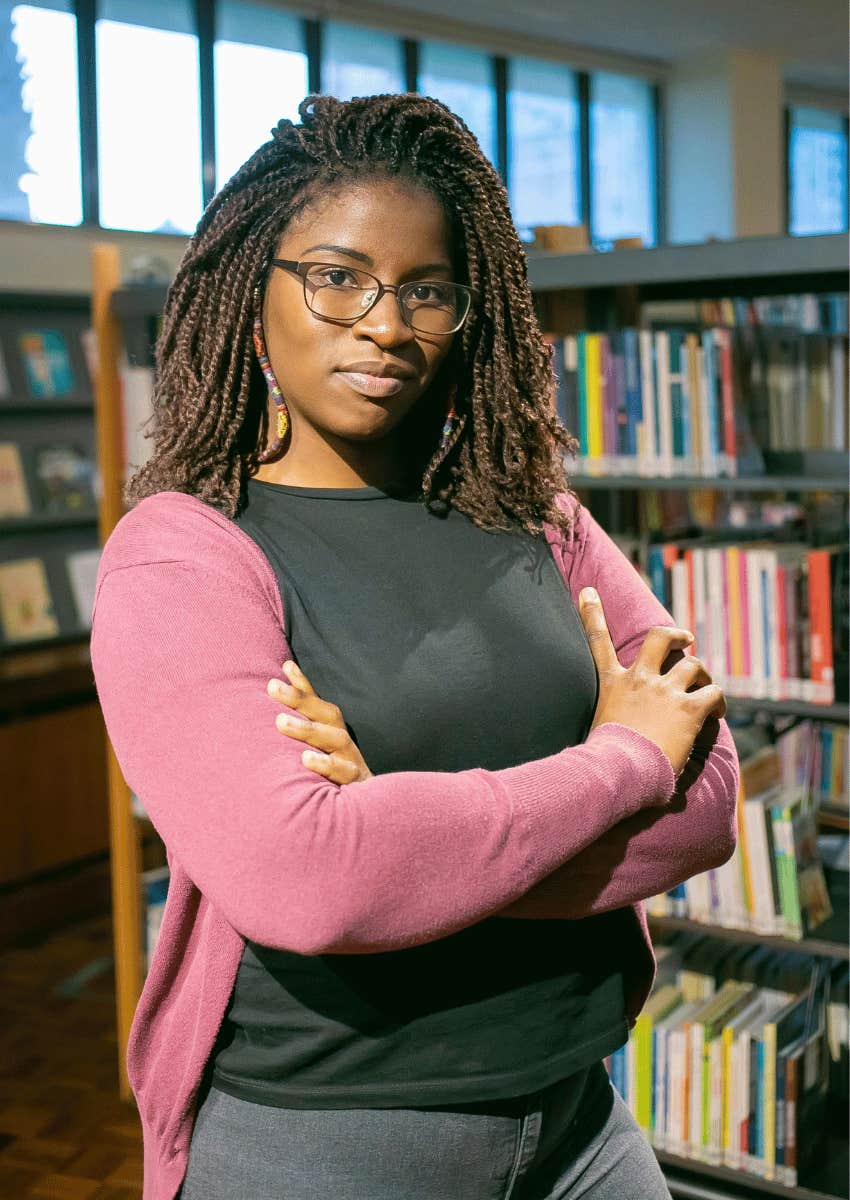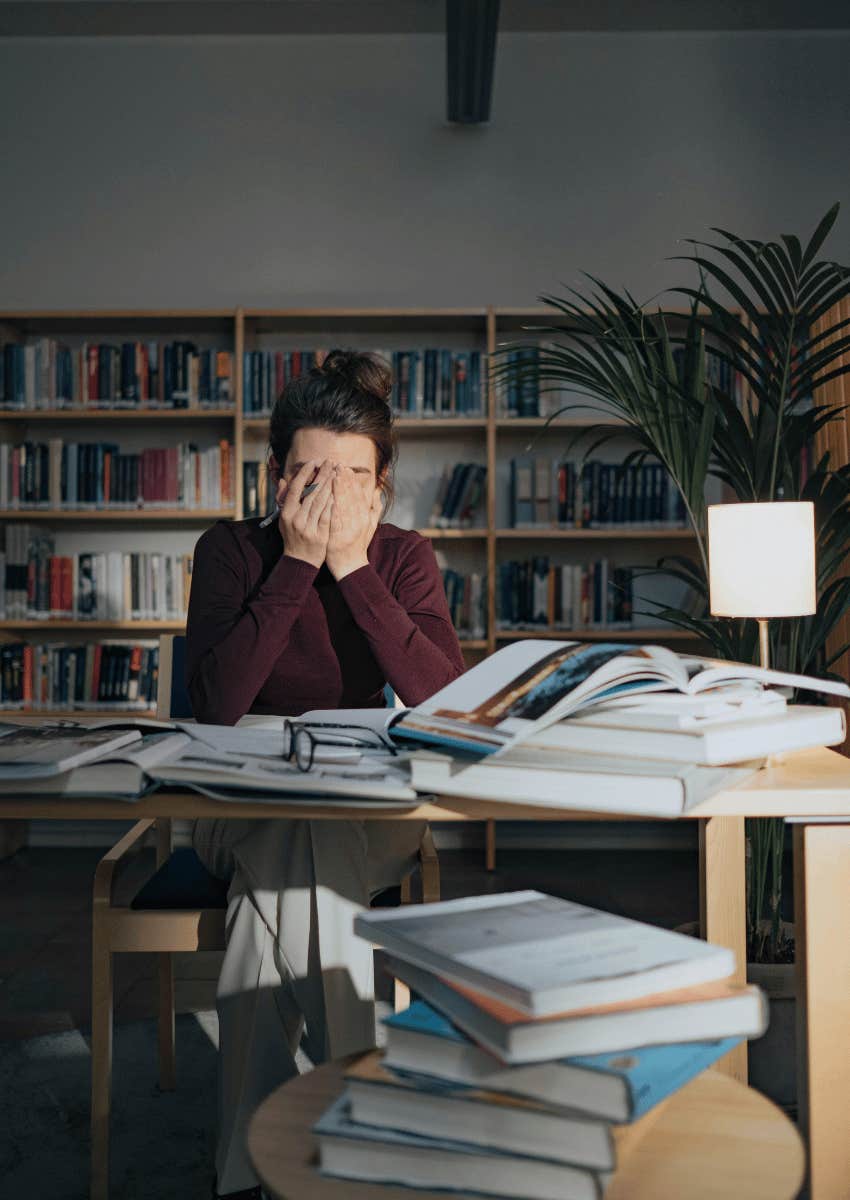I’m A Queer School Librarian, And Book Bans Enrage Me — 'My Straight Students Feel Unsafe Around A Gay Self-Help Book'
To some, I probably represent the sins of a “woke” society. But I want to live in a world where I can feel safe to be my true self.
 liu mingzhu | Canva, Sherman Trotz | Pexels
liu mingzhu | Canva, Sherman Trotz | Pexels It’s never a good thing when your boss calls you at 3:30 pm on a Friday. I was commuting home, engrossed in the audiobook of The Reappearance of Rachel Price, thankful for the distraction after an exhausting day of teaching 11th graders (16 to 17 years old) how to evaluate health information on social media.
I needed a respite from family drama, too — particularly the recent mental health issues of my 11th-grade son, but also the upheaval of my relationship with my homophobic parents. They haven’t reached out since I came out to them as bisexual ten weeks ago now, and now I’m preparing to come out to my in-laws. They’re better people, but still.
It had been a long week. I almost didn’t answer my principal’s call.
“Hi Matt …” I wondered if he could hear the hesitation in my voice.
“Hi! Anna.” The way he spoke made me wonder if he was hoping I wouldn’t answer.
We get along well enough, perhaps each sensing that the other is also a degree of neurodivergent. We even look our parts, Principal Matt in his three-piece suits and me, the school librarian, with my hair typically back in a low bun.
Not that we could see each other now. I did my best to keep my eyes on the road while I braced myself for bad news. Sometimes Matt calls me when he can’t remember a database password, but lately, it seems that every time we talk, it’s about yet another challenge against one of the books in my high school library.
Book challenges aren’t anything new for me as a queer school librarian.
 Kampus Production | Pexels
Kampus Production | Pexels
I’ve been a school librarian for over twenty years, and I’m the head of our district-wide department. I led my team in developing selection policies to ensure that our collections are not only appropriate but rich in both quality and diversity. Just a few years ago, I helped update policies for handling challenges from parents who object to certain books — well aware of the political climate.
The so-called Moms for Liberty are leading the charge on these challenges to certain titles in our school libraries. This group encourages their conservative women members to access our library catalogs, search for specific titles, and then raise a huge fuss. Parents are more than welcome to restrict their children from checking out any materials. Their kids, their rules.
But to remove the book from the library so that no kid in that school can have access to it? A book that’s already gone through a selection process, chosen for not only its merits but also its potential usefulness for a particular student need? That’s blatant censorship.
The students seem to get it. They listened intently to my September lesson on intellectual freedom, scrutinizing the slide showing the covers of the past year’s most challenged books. I see their eyes take in an array of covers, and I know they see the rainbow theme.
Gender Queer by Maia Kobe has been the most banned book in the U.S. for three years now, I tell them. I add, that it was put on trial in Virginia, where a judge declared it “not obscene.”
Gender Queer is a memoir in graphic-novel format about a person questioning their gender and sexuality. It’s in our library, I explain, because it’s important to represent as many people’s identities as we can. But, I go on, sometimes people have issues with that topic, and others like it.
Other titles on the ALA’s list of “Most Challenged Books” are All Boys Aren’t Blue by George M. Johnson and Flamer by Mike Curato. This Book is Gay, bright, and beautiful in its spot at number three, and has been on the banned books list since 2016.
The last time Matt called me was just a few weeks ago, about a parent complaint against ‘Gender Queer’ and ‘This Book is Gay.’
Hear her out, I advised Matt. Most parents just want to express their values and concerns. Others are mostly complaining so that they can brag to their Moms for Liberty friends that they “told off” the school.
That particular mother lamented to Matt that she didn’t want her daughters to read these books, lest it “turn them gay.”
 Eddson Lens | Pexels
Eddson Lens | Pexels
I fume beneath my skin at the parents’ sentiments. I know the power of books, yes, and I know all too well how these parents feel about queer people because my parents are just like them. So I also know how to keep my feelings locked inside; at work, they praise this suppression as “professionalism.”
Matt responded to that parent as I’d coached him — offering to put restrictions on the girls’ accounts, but emphasizing that the books couldn’t be removed without going through the formal challenge process.
So far, complaints have always fizzled, usually shortly after I hand over official paperwork. The first question surely looms large: Have you read the work in its entirety? The following questions ask complainants to consider the book’s accolades along with the way they feel it violates their values.
Matt and I thought we’d mitigated the situation a few weeks ago, but the superintendent called me last week to say that this parent had submitted a formal complaint to the school board. I figured that Matt was calling about that. But he wasn’t.
“Anna, do you know Addie Baker?”
“Addie? Of course!” I had known her since she was a little kid. She had often lingered in the library long after her class left, intent on being my helper. When I announced that I’d be transferring to the high school, I found then-8th-grader Addie crying on the shelves. “I’m just sad you won’t be my librarian anymore.”
I chuckled in response, reminding her that I would be her librarian for four more years at the high school. Adolescent emotions don’t always make sense — I know this as an educator as well as a parent. Heck, all of us who’ve been through that phase of life can surely remember the horrors of teenage angst.
By the time Addie started at the high school a year later, she was much more chill. I was glad to see that she had found a friend group, and I wasn’t offended that she didn’t visit this library with the frequency of her younger days.
All I told Matt, though, was, “I know her from Bedford.” Then I paused, my motherly instincts in overdrive from my rough week dealing with my son’s issues. I stammered, “Matt, is she okay? What’s wrong?”
I heard Matt clear his throat on the other end of the line. “Oh. Yes, yes. She’s fine, it’s just she came in here very upset about a book today.”
I felt my brain quickly scanning the possibilities, still worried about her. Books can bring up emotions, this I know. They can trigger the brain to dwell on something that you didn’t want to dig up.
“The book is called Queer: The Ultimate LGBTQ Guide for Teens,” Matt said.
I felt my heart sink. Another queer book complaint. Which is to say, another complaint about queer people.
Even the superintendent had admitted as such last week when I assured her that the books from that complaint weren’t pornographic. “Let’s be real, Anna,” she said. “They’re not bothered by sex scenes. They’re trying to ban these books because of their homophobia.”
I can’t help it — I take all of these book bans a bit personally.
 Ron Lach | Pexels
Ron Lach | Pexels
But it’s not professional to talk about sexuality with colleagues, so hardly anyone at work knows my truth, Matt included. Therefore, he probably didn’t understand why I stammered as I did, still driving through rush hour traffic.
“Upset? By… what? Why?” I immediately knew why, just as I knew that book. It’s a guidebook, self-help for teens grappling with emerging sexuality that differs from “the norm,” whatever that is.
“She said it was completely inappropriate,” Matt said. “But I looked it up on Amazon. It says it’s for grades 6 through 12, kids ages 11 to 18.”
I was briefly reassured, glad to be reminded that this book would pass the test of meeting our selection criteria. Not that I ever pushed those boundaries; I also make sure that every queer book is bolstered with glowing professional reviews. And yet, it wasn’t the possibility of a battle over the book that had my stomach suddenly in knots.
Matt went on. “It sounds like she just found this book on the library shelves, but didn’t check it out. Maybe it was on display? Or maybe she looked it up to make a point; she is very conservative, you know. Anyways, she was hard to understand. She was very upset. She said that she feels unsafe with this book in the library.”
Matt made a noise that sounded like a cross between a chuckle and a scoff before he continued. “I told her that there would be many other people who would feel unsafe if this book wasn’t in our library…”
He’d tried to reason with her, he explained, but I should be prepared to deal with this next week. I appreciate Matt’s support and sentiment, but the knot in my stomach persisted. This wasn’t the same old story as so many book challenges before. This complaint came from not only a student but from one of my “library kids.”
I exhaled loudly. “Okay, Matt. Thanks,” I said. I didn’t know if he heard the crack in my voice, but I felt the need to explain it either way. “Sorry,” I added, “I’m just so disappointed.”
After Matt and I ended the call, I drove in silence for several more miles. I desperately wanted to give Addie the benefit of the doubt. But I couldn’t help recalling my superintendent’s sentiments. I noted that while Addie might have been uncomfortable with this particular book’s section on how queer people have sex, she didn’t complain about the heteronormative sex-ed guides in our library, such as Hannah Witton’s Doing It.
And then I started getting fired up. Unsafe? Really?
What about the dozens of queer kids who needed that book in the library — some out, some questioning, some hiding, and some still unaware of their identities.
 Drazen Zigic | Shutterstock
Drazen Zigic | Shutterstock
Nearly 30% of GenZs identify under the LGBTQ umbrella, after all. They need to see themselves represented in the media — all of us do. And what about my fellow queer colleagues? There’s the “gay guy” across the hall who is bisexual. And that edgy teacher I’d immediately liked despite my secretary’s cautions? Yup, another bisexual woman married to a man.
How many more of us are hiding in plain sight, afraid to express our true selves? Shouldn’t we be the ones who feel unsafe?
Unsafe is being on the brink of being improperly outed, ostracized, or perhaps accused of grooming teenagers via queer content in the books I buy for our library.
Unsafe is when I have to pause before I purchase books featuring queer characters, worried that homophobic parents or students will discover my identity and weave a story web about a bisexual librarian promoting “perversion” with taxpayer funds.
Unsafe is sitting through meetings, one with six sets of parents, mothers crying to me and my principal about supposedly inappropriate books. “I’m an English minor and I have a gay friend,” one mom insisted. “It’s not that I’m homophobic. I just don’t think children should be reading about those things.”
Unsafe is knowing that my lesbian daughter will be judged harshly based solely on who and how she loves. It’s knowing that some people blow off my demiboy son as weird — and maybe even a threat to “manhood.”
Unsafe is when I wake up in the middle of the night, worrying that the wrong person will discover my writing — those sometimes-explicit details of how I found true love and sexual satisfaction with a man, and how I’ve found balance in my bisexual desires through non-monogamous exploits with other women.
Unsafe is the constant fear that being out as a bisexual could somehow cause me to lose my job. I’m the breadwinner, and my family of six desperately needs my health insurance.
To some, I probably represent the sins of a “woke” society. But all I want is to live in a world where I can feel safe to be my true self.
 Engin Akyurt | Pexels
Engin Akyurt | Pexels
I’m not supposed to take book banning personally. I’m supposed to be altruistic — vague about the library patrons I’m protecting, offering stoic solutions for those who oppose items in the collection. I’m growing frustrated by the facade.
Maybe my purpose in life isn’t only to fight off book banners but also to represent those like me by being open about my authentic self. Through writing, of course, but perhaps also in person, even in a professional setting.
No, I’m not going to come out to Addie specifically; I know there are better ways to address this issue. I’ve been a librarian for a long time, after all. I know what I’m doing.
But this entire situation is just another log on the pile, fueling a fire that was sparked in me years ago. Soon, it’ll surely be a bonfire.
I suppose you might say that I could go up in flames with it. I’m hoping that I’ll simply be one of many to bask in its warmth. That is to say — I need to have hope.
The Trump signs increase in frequency as I drive home to my exurb. Lately, I’ve been feeling like there’s a declaration of queer hate in front of every other house. I only had about ten minutes left in my commute, and while I was still bothered by book bans and their associated homophobia, I was also desperate to know if Rachel Price’s husband was the kidnapper.
So, I resumed my audiobook. Think or say what you want about me and my “kind” of people, but when it comes down to it, I’m just another middle-aged woman who enjoys a twisty mystery on a beautiful October afternoon.
Anna Eliza Rose is a librarian and bisexual, married mom of four who writes about love, sex, and identity. She is currently working on a follow-up to her memoir, Pretty Kinky for a Love Story.
